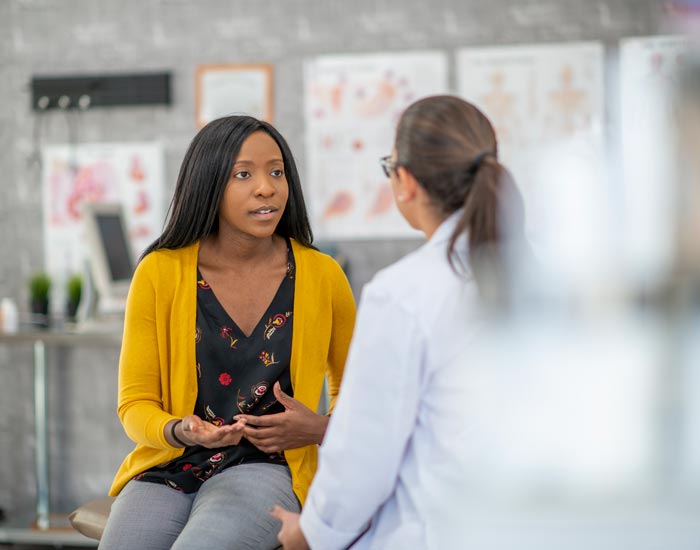Endometriosis Treatment New York, NY
What is Endometriosis?
Manhattan Reproductive Surgery Center wants you to be well-informed on conditions like endometriosis so that you can make educated decisions about your health and wellbeing. Our caring medical staff is ready to help patients throughout Greater New York City at our endometriosis treatment center. Endometriosis is a condition involving tissue in the endometrium, or inner lining of the uterus, growing outside the uterus and into other areas of the body. These areas include, but are not restricted to, the ovaries and fallopian tubes, and the growth causes multiple issues. These misplaced tissues behave the same as healthy endometrial tissue, building up each month, breaking down, and causing bleeding. Unfortunately, the blood has no way to leave the body like the lining of the uterus does, causing internal bleeding. This internal bleeding inflames surrounding tissues and may form scar tissue, which may lead to infertility.
What Are the Causes of Endometriosis?
The causes of endometriosis are unknown. One theory is the cells travel backward through the fallopian tubes and into the pelvis during a period, and once there, the cells attach to the tissues and grow. However, cells traveling backward occurs in many women during their periods. The immune system may play a part in causing women to develop endometriosis. A woman’s ovaries produce hormones every month to tell uterus lining cells to swell and grow thicker, which shed with blood and tissue during their period. Endometriosis occurs when these same cells grow in places outside a woman’s uterus, attaching to areas in other parts of the body, such as the following:
- Fallopian Tubes
- Ovaries
- Bladder
- Bowel
- Rectum
- The lining of Your Pelvic Area

How Do We Diagnose Endometriosis?
A surgery called laparoscopy is the gold standard for diagnosing endometriosis. Many believe an ultrasound is limited in detecting the condition, so not seeing it on the ultrasound does not mean it is not there. While an ultrasound also detects lesions located in the ovaries, you do not need lesions to have endometriosis. Diagnosing endometriosis without surgery, such as laparoscopy, is not as reliable. Performing surgery in the properly selected patient can help with painful menstrual symptoms, and many times, it is the only way to treat a lesion adequately. However, diagnosing endometriosis requires thorough testing and exams to verify its presence, severity, and locations in the body it affects. The medical professionals at Manhattan Reproductive Surgery Center perform a collection of procedures to confirm this condition and determine the best treatment options. Testing and exams include a pelvic exam, transvaginal ultrasound, pelvic laparoscopy, and magnetic resonance imaging (MRI). Using a comprehensive physical exam and imaging, we have greater success accurately detecting endometriosis and where the tissue growth is located.
Be Aware of the Symptoms of Endometriosis
Some women diagnosed with endometriosis may not have any symptoms, but those who experience symptoms commonly suffer from pelvic pain, ovarian cysts, severe pain with menses, painful bowel movements during menses, vaginal bleeding, pain with intercourse, and infertility. Patients may only experience these symptoms around the time of menses since pelvic pain is cyclical. Whether a patient experiences early symptoms of endometriosis or visits us to help with fertility, the medical staff at Manhattan Reproductive Surgery Center takes your symptoms seriously and ensures you get the medical attention you need. We’ve described an endometriosis symptoms list for you to recognize below:
- Painful Periods – Also known as dysmenorrhea, this symptom includes pelvic pain starting before a menstrual period and extending several days into it. You may also experience abdominal or lower back pain, and it is common to have pain during and after sexual intercourse.
- Painful Urination or Bowel Movements or Intercourse – These symptoms are most likely to occur during a menstrual period.
- Excessive Bleeding – Women with endometriosis may occasionally have heavy menstrual periods or intermenstrual bleeding, which is bleeding between periods.
- Other Symptoms – This condition can cause various symptoms like bloating, nausea, constipation, diarrhea, or fatigue. These symptoms occur especially during a woman’s menstrual periods.
- Infertility – Women seeking infertility treatment sometimes get diagnosed with endometriosis.

Understanding the Stages of Endometriosis
Endometriosis stages progress in severity, and Manhattan Reproductive Surgery Center strongly encourages you to be aware of what to expect. Endometriosis is classified into the following four stages:
- Stage 1: Minimal
- Stage 2: Mild
- Stage 3: Moderate
- Stage 4: Severe
Classifying the endometriosis stages is based on the exact location, extent (including presence, size, and depth) of endometriosis implants outside the uterus, and presence and severity of any scar tissue. It is important to note the endometriosis stage does not always correlate with any symptoms the patient may experience.
Complications Resulting from This Condition
Patients dealing with endometriosis should be aware of the associated complications and how they can impact their health and wellbeing. Some notable complications include the following:
- Infertility – Getting pregnant is difficult for one-third to one-half of women who have endometriosis. This condition can obstruct the fallopian tube and prevent the egg from uniting with the sperm. It can also damage the sperm or egg.
- Higher Risk of Gynecological Cancers – Patients with endometriosis develop ovarian cancer at higher rates, even though the risk of ovarian cancer is generally low. While that cancer type is not a major concern, women with the condition can develop another rare type of cancer, called endometriosis-associated adenocarcinoma, later in life.
- Other Conditions with the Same Symptoms – Alternate diagnoses with the same or similar symptoms to endometriosis include pelvic congestion syndrome, fibroids, cysts, pelvic floor issues, and interstitial cystitis.
Effects on Fertility
Untreated endometriosis can often be the root cause of a woman’s infertility when trying to conceive. Surgery addresses the pain and discomfort associated with endometriosis, and it can contribute to improved pregnancy rates depending on the patient’s particular issues caused by endometriosis. Surgery may also help optimize pregnancy conditions, provide insight into a patient’s former diagnosis of unexplained infertility, and improve multiple failed attempts using Assisted Reproductive Technologies (ART). You might be trying to boost natural pregnancy rates, make IUI, IVF, and other fertility technologies more successful, or clear up any stage of existing endometriosis. Manhattan Reproductive Surgery Center is ready to provide the most effective treatment options to help you reach your goals.
How Do We Treat Endometriosis?
Manhattan Reproductive Surgery Center keeps your overall reproductive health and fertility in mind when treating endometriosis. Our caring medical team uses minimally invasive laparoscopy as the gold standard to identify and remove endometrial tissue, avoiding removing normal tissue or reproductive organs. The procedure’s minimally invasive style lets you recover in less time and helps prevent additional problems in the future. It is also considered generally safer and leaves less scar tissue. Endometriosis is a progressively destructive condition we can effectively treat with fertility surgical intervention. This method should restore a patient’s natural fertility and decrease their reproductive potential’s progressive decline. For your benefit, we have described effective treatment options to deal with endometriosis:
Hormone Therapy
Using these medicines prevents endometriosis from getting worse, and they come in injections, nasal sprays, and pills. Some examples of hormone therapy include birth control pills and progesterone pills or injections. Please note some types of hormone therapies prevent women from getting pregnant while on the medication.
Laparoscopy
This procedure helps us accurately diagnose the condition, and we can remove scar tissue and growths. Laparoscopy only requires a small incision in a patient’s belly to provide access, so they recover and heal quicker than other surgeries.
Hysterectomy
During this extensive procedure, a patient’s uterus, ovaries, and fallopian tubes are removed. With the ovaries removed, a patient enters menopause. A hysterectomy is only an option in severe cases where symptoms don’t get better with other treatments, and the patient has decided not to have children. We do not perform hysterectomies and typically do not recommend them.
Treating Your Endometriosis in Greater New York City
Manhattan Reproductive Surgery Center is committed to providing our patients with the best possible treatment for endometriosis, starting with a medical consultation to evaluate their condition. Before we schedule your appointment, our medical team will collect your insurance information to confirm we accept your plan. If we do not accept your insurance plan, we will inform you of the out-of-pocket costs related to a consultation for which you will be responsible. Our team will help you weigh your options to determine the best action to take. In any case, our doctor must see you before we can inform you of what is entailed in treating your condition, both medically and financially. Contact us today to schedule an appointment at our treatment center and get professional care for your endometriosis.
